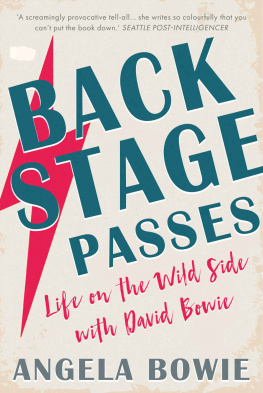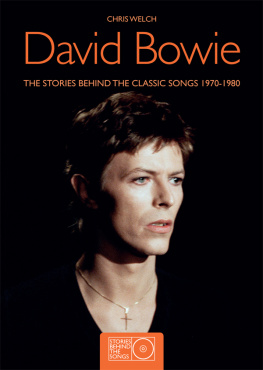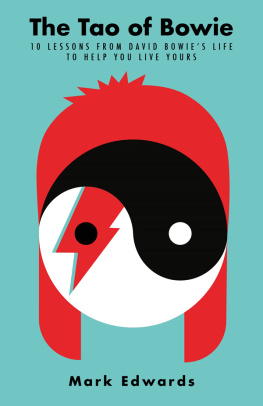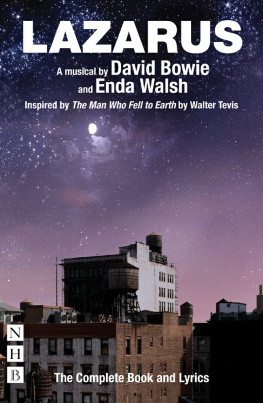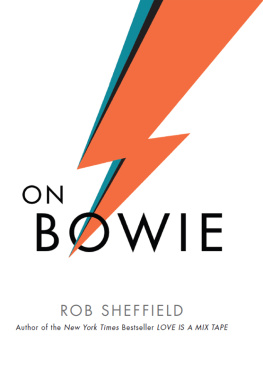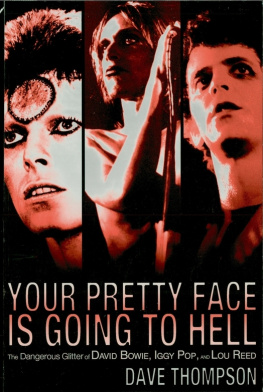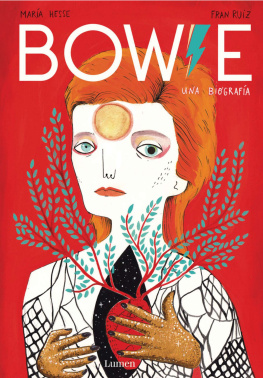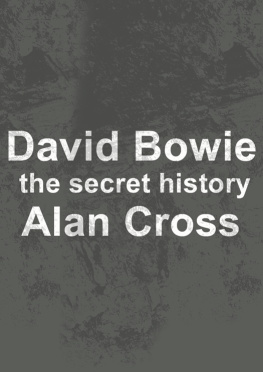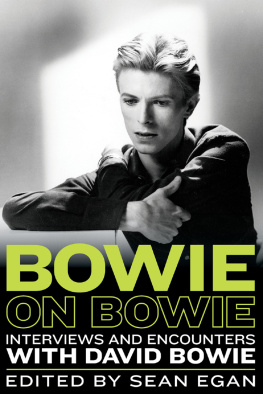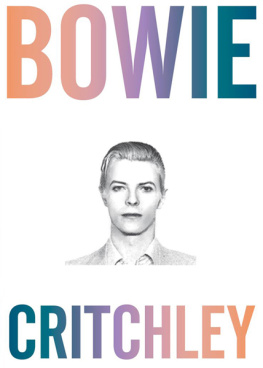BACKSTAGE
PASSES
Angela Bowie
with Patrick Carr
Angela Bowie with Patrick Carr 1993
Angela Bowie with Patrick Carr has asserted their rights under the Copyright, Design and Patents Act, 1988, to be identified as the author of this work.
First published in 1993 by The Berkley Publishing Group.
This edition published in 2020 by Endeavour Media Ltd.

Table of Contents
FOREWORD
Something is missing from this page. I wanted to use the lyrics of Angie, by Mick Jagger and Keith Richards, but was refused permission by the songs publishers, EMI Music.
My reasons for wanting the words from Angie here will become obvious enough when you read what I have to say about my adventures with Mick Jagger. EMIs reasons for refusing me, on the other hand, are a little puzzling, especially since Im still quite fond of Mick. The publishers polite letter mentioned contractual obligations and left it at that. Who knows? Maybe Mick is still a little pissed about my appearance on Joan Riverss show, where I recounted my finding him and my husband in bed together. Well, more on that anon.
The refusal of permission to use Golden Years, one of the songs my ex-husband wrote for me, was much more explicit. One Robert D. Goodale, executive vice-president of Isolar, Davids business company, advised me in a nasty little note not only that I could not use lyrics from that song in this book, but that David completely disapproved of the book and would offer absolutely no help, and that some of his key people had been alerted to do the same.
Well. Things certainly have changed since I first heard David playing Golden Years to me over the telephone, trying to win back my ravaged heart (and succeeding). Theyve changed even more since he first played The Prettiest Star to me and convinced me to marry him despite his problems. But I understand. Im sure the last thing he wants is to see this book in print.
Angela Bowie
PREFACE
I remember exactly where and when David Bowie and I first slept together. It was in London in the early summer of 1968, after an evening at the Speakeasythe night King Crimson celebrated their new recording contract and Donovan got up and sang Buddy Holly songs with them; just a wild, wonderful rock-and-roll nightand David came back with me to my little room above the Nomad Travel Club in Paddington. The colorful part of Paddington, that is, and really, what a scene: a South African owner, a wrestler from Lebanon who worked security, a waitress from Newcastle who was a really great singer, a band from Mexico who were huge pop stars at home but nobodies in London, a dozen other assorted stars and reprobates, and my Australian roommate and I, selling three-day package holidays in Ibiza to drunken Irishmen as they rolled out of the disco. It was too wild: Swinging London, seamy side up.
That night it was just David and I, though, unless of course you include the much-fabled Lance of Love. Lance was such an active, popular fellowhe never met a stranger, probably never willthat you could make a good case for his being a whole separate character in his own right.
He certainly seemed quite independent in Paddington. David was pretty drunk and we were both pretty exhausted when we fell into my little bed together, but instead of sleep, here came Lance: strong, silent, and suddenly running the show.
It was, I must admit, impressive. Hardly heavenlyalthough Lance was long on stamina as well as just plain long, he was short on sensitivitybut a convincing performance in Davids terms. His pride in the size and staying power of his sexual equipment was quite obviously justified. That night, then, I was introduced in no uncertain fashion to one intrinsic and essential aspect of David Bowies character: The man is a stud, and proud of it.
The morning brought another insight. David left me early, and he was very abrupt about it. That was startling, an unpleasant contrast to how hed been at the Speakeasy; it was as if he were saying, That was then, this is now. I have to get back to what I have to do . All he actually told me was: Ill call you.
This infuriated me, but I understood what was going on. For David, there was no sentiment involved. What hed done with me was a piece of work, just a part of the overall plan he was putting together. When he came up to London in those dayshe was living in the suburbs, in Beckenhamhe had to make the rounds. Im sure that after he left me that morning, he went on to Ken Pitt, Calvin Mark Lee, and probably a couple of pieces of trade on the side.
But that was okay. It was like having a really mischievous cat. You may hate it, but you dont love it any less. And that was David: just a bad, bad cat. Thats how he acted. He used sex the way a cat sprays, to mark his territory. It gets the job done.
Does it ever.
SWINGING
LONDON
London in 1966 was wonderful, the worlds greatest city at one of its highest times.
It was a place emerging from the dark into the light; it felt open, free, optimistic, ready for anything. When I picture it today, I see flowers blooming, people laughing, color everywhere. This wasnt the old London, the ravaged underdog of the Blitz or the cold, gray smoggy sprawl of the austere postwar years, but an exciting, playful place alive with art, adventure, and the sublimely civilized eccentricity at which the British, bless them, are uniquely adept.
Britain as a whole was looking up, not back at old glories or down into disaster. Internationally, the sun had set on the Empire and its endless bloody wars and holding actions, while at home unemployment was low, the welfare state in its heyday, and a Labour government sponsoring reform and liberalization on every front.
The entire culture, it seemed, was changing. The Beatles and the Stones and the Who had kicked holes in the old British barriers of class and decorum and inhibition, and all the other young upstarts were flooding through; for the first time, the stars of the media werent lords and ladies or the chosen favorites of the elite, but unpedigreed pop singers, artists, models, photographers, designers, whoever had the look or the sound or the attitude. At long last you didnt need a plum in your mouth and a rod up your ass (excuse me: your arse ) to get anywhere in British society.
Even on the meaner streets, good things seemed to be happening. The pitched battles between mods and rockersthe mods hip little pill-popping toughs in Italian-cut suits; the rockers beer-swilling greasers in black leather and Brylcreem; both groups unpredictable, antisocial, and violenthad abated, and it looked as if there was room for everyone in the fun spots of Swinging London.
The high times would end soon enough, of course, and Britain would fall into a nightmare of economic recession, unemployment, gang violence, epidemic drug abuse, revolt and repression in Northern Ireland, and full-scale race and class warfare on the streets of its own cities. But for a few years in the sixties, London was just a gas: beautiful, safe, prosperous, creative, wide open, and wild. You could get whatever turned you on: peace and love, power and money, pomp and prestige, art and culture, hash and speed, call girls and rent boys.
Sex was at the heart of it, just as it was in Paris and Amsterdam and New York and San Francisco, the other power stations on our generations cultural energy circuit. I really dont think the rest of itthe revolutions in pop culture and politicswould have been possible without the sexual revolution of the early and middle sixties. And that wouldnt have been possible without the Pill, for it was the availability of the Pill that created the most significant fact of the matter: In 1966 my contemporaries and I were the worlds first generation able to have sex without pregnancy whenever it pleased.
Next page
